The bull sperm whale that was found on Thursday morning at Hunstanton in Norfolk has died. It is the 29th sperm whale to have mysteriously died along the North Sea coast over the past four weeks – all of them were males. Tests will now be carried out to try and determine why.
Rescuers had kept it comfortable and had hoped that it would eventually manage to get back into deep water after the tide came in. Sadly, that did not happen and it died on Thursday evening at about 8pm.
Over the past two weeks, six whales have died on the UK’s east coast.
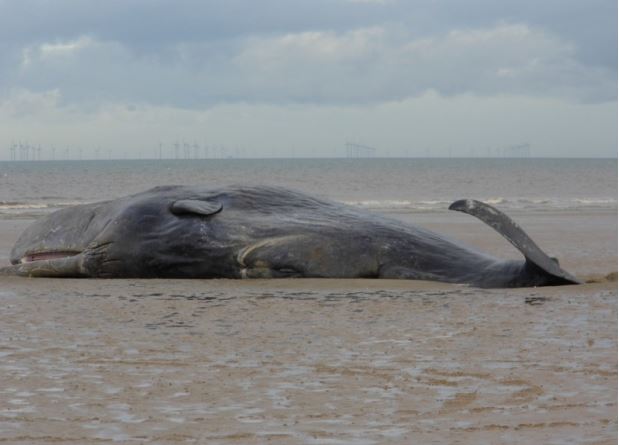 Sadly, this beautiful bull sperm whale died on Sunday evening. Rescuers were unable to get it back into deep water. (Image: Cetacean Strandings Investigation Programme)
Sadly, this beautiful bull sperm whale died on Sunday evening. Rescuers were unable to get it back into deep water. (Image: Cetacean Strandings Investigation Programme)
Rob Deaville, from the Cetacean Strandings Investigation, who will be examining the whale that died, believes its death was probably the best outcome as far as the animal’s welfare was concerned. Cetaceans are marine mammals of the order Cetacea, and include whales, dolphins and porpoises.
Why are so many whales dying?
Nobody knows why they are dying in such large numbers. Several suggestions have been offered, including military submarines or shipping vessels which may be interfering with the animals’ ability to hear (echolocation) their prey and communicate with each other, or PCBs (polychlorinated biphenyls), which were banned in the 1980s but still linger in seawater and undermine their reproduction.
Mr. Deaville will first try to determine why these whales, which he believes formed a bachelor pod (group of males), came into the North Sea in the first place.
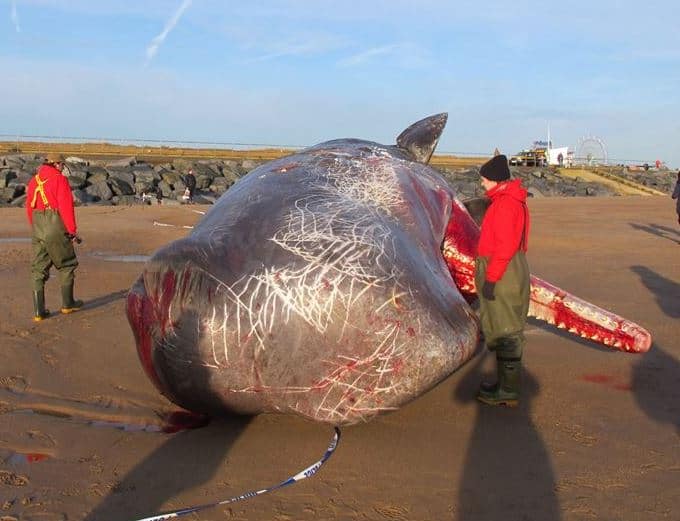 Feb, 2, 2016. This sperm whale was found dead stranded at Skegness in Lincolnshire, England. (Image: Cetacean Strandings Investigation Programme Facebook)
Feb, 2, 2016. This sperm whale was found dead stranded at Skegness in Lincolnshire, England. (Image: Cetacean Strandings Investigation Programme Facebook)
The BBC quoted Mr. Deaville as saying:
“There are many possible reasons and we’re keeping a very open mind about the whole investigation.”
He said that when he first saw the dead 46-foot (14-metre) long animal, it had “quite an emotional impact” on him. “This dim shape appeared out of the gloom. You got closer and closer and there was this whale, lying on its side on the sand… it had been alive just an hour earlier,” he added.
He said the animal was undoubtedly suffering while on shore. He does not think it had any chance of being rescued or refloated “which is what a lot of people hoped would happen – and it wouldn’t have been a good outcome here. So probably the best outcome in terms of the welfare of the whale is that it died fairly quickly.”
Did they follow a shoal of squid into North Sea?
Peter Evans, Director of The SeaWatch Foundation, said:
“Sadly, this kind of thing happens periodically as sperm whales congregate in social cohesive groups which we call pods and can often strand together as we have seen over the last weeks, here and in Holland and Germany. Sperm whales normally live in waters of two or three thousand metres depth in the offshore North Atlantic. Groups of adolescent males migrate each year from the tropics and subtropics into high latitudes such as around NW Europe. ”
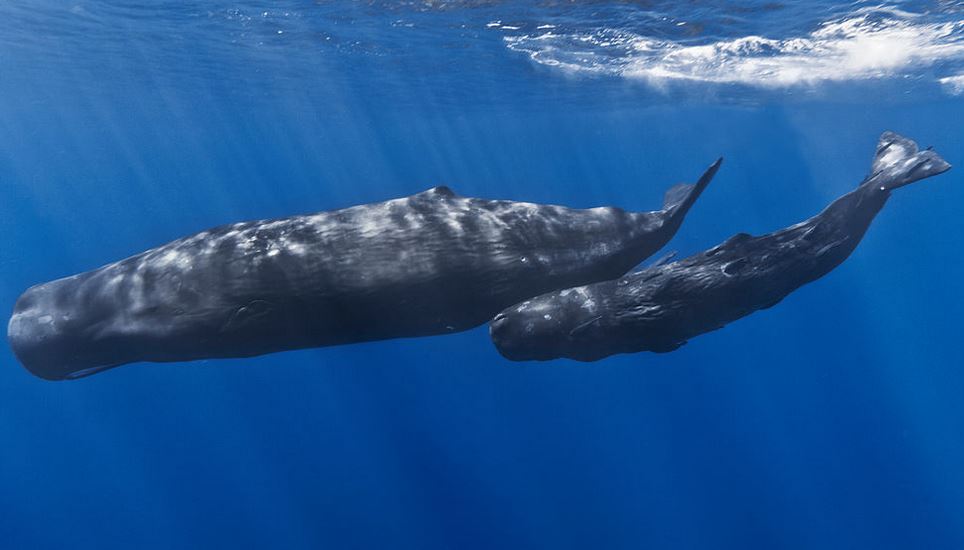 Sperm whale mother and her calf off the coast of Mauritius. Females and their young stay in the tropics, while males can be found off the coast of Norway, Iceland and Shetlands. (Image: Wikipedia)
Sperm whale mother and her calf off the coast of Mauritius. Females and their young stay in the tropics, while males can be found off the coast of Norway, Iceland and Shetlands. (Image: Wikipedia)
“They feed principally on squid and what has probably happened is that one or more shoals of squid have entered the North Sea from the Atlantic and the whales followed them, fed upon them, and then maybe ran out of food.”
“I’ve been working on marine mammals for several decades and an event like this is always very sad. As always, there should be a full investigation to see what we can learn from this. Fortunately, we have an experienced team of pathologists from the Zoological Society of London who are conducting a post mortem analysis in the UK, and Dutch and German scientists have been doing the same in their countries.”
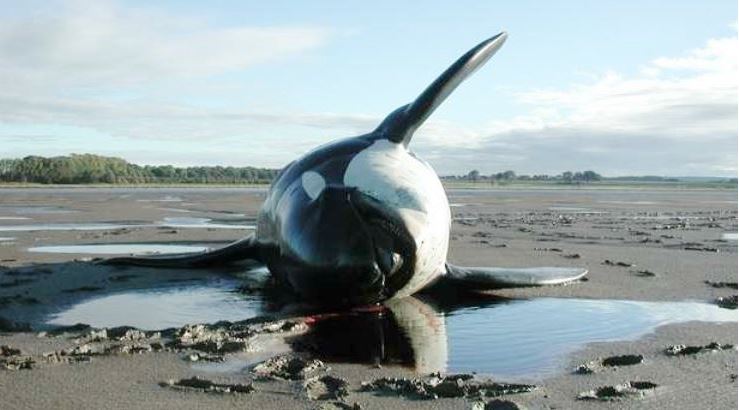 Killer whales face several problems caused by humans. Even though PCBs were banned thirty years ago, their lingering effects mean European killer whales and dolphins are at serious risk of extinction, scientists from the Zoological Society of London warn. (Image: Zoological Society of London)
Killer whales face several problems caused by humans. Even though PCBs were banned thirty years ago, their lingering effects mean European killer whales and dolphins are at serious risk of extinction, scientists from the Zoological Society of London warn. (Image: Zoological Society of London)
Noise from ships harming killer whales in USA
Scientists at the Universities of Washington and Colorado found that ship noise is harming killer whales (orcas), and is probably one of the main reasons for the recent increase in the number of deaths along the North American coast.
When ships pass, their noise interferes with the whales’ ability to locate and pursue prey, as well as their ability to communicate with each other.
When a killer whale is chasing prey it emits click sounds and listens for their echoes.
Could ship noises in the seas near the coasts of northern European countries be linked to the recent deaths of sperm whales?
The growth in commercial shipping globally has increased the intensity of low-frequency noise by nearly 20-fold over the past five decades.
Video – Sperm whale stranded on Hunstanton beach died

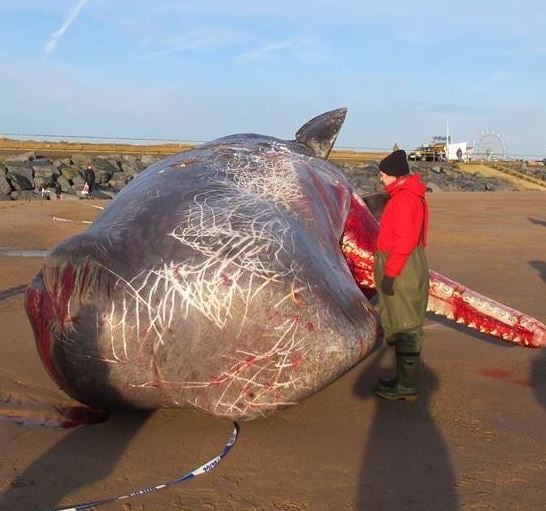
Comments are closed.